
Tuen Mun District is one of the 18 administrative districts of Hong Kong. As of 2021, it had a population of 506,879. Of these, 64,000 are under the age of 18. Part of the district is the Tuen Mun New Town, which contains one of the largest residential areas in the New Territories.
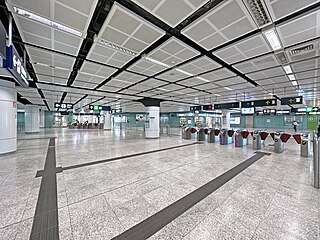
Siu Hong is an MTR station located beside Siu Hong Court, Tuen Mun, New Territories, Hong Kong. It is built on the Tuen Mun Nullah immediately east of Siu Hong Court. The station is on the Tuen Ma line between Tin Shui Wai and Tuen Mun stations. Elevated public transport interchanges are provided at both the south and north ends of the station. Two access ramps link the public transport interchanges to Castle Peak Road and Tsing Lun Road for access to feeder services such as buses, minibuses, and taxis.
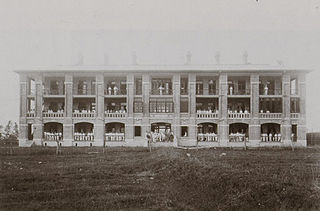
Lingnan University was a private university from 1888 to 1952 in Guangzhou, Guangdong, China. It was established by a group of American missionaries in 1888 as the Canton Christian College (格致書院).

Lingnan University (Lingnan) is located in Tuen Mun, New Territories, Hong Kong. It intertwines research with teaching.

Castle Peak or Pui To Shan (杯渡山) is a 583-metre (1,913-feet)-high peak in western New Territories, Hong Kong. It is also the highest granitic hill in Hong Kong.

Tuen Mun or Castle Peak is an area near the mouth of Tuen Mun River and Castle Peak Bay in the New Territories, Hong Kong. It was one of the earliest settlements in what is now Hong Kong and can be dated to the Neolithic period. In the more recent past, it was home to many Tanka fishermen who gathered at Castle Peak Bay. Tuen Mun is now a modern, mainly residential area in the north-west New Territories. As of 2011, 487,546 residents live in Tuen Mun.
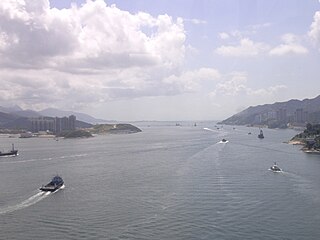
Urmston Road is a broad body of water between Lantau Island and Tuen Mun in Hong Kong. It forms an inshore passage between the northwest end of Victoria Harbour and the mouth of the Pearl River. At its eastern end it connects to the Western Working Anchorage through the Ma Wan Channel and the narrower Kap Shui Mun channel to the west of Ma Wan.

Tuen Mun New Town, commonly referred to simply as Tuen Mun, is a satellite town of Hong Kong. It is one of the new towns that were developed by the Hong Kong Government in the New Territories from the 1960s. It was built around the existing rural local centre of Tuen Mun, which has since been referred to as the Tuen Mun Kau Hui and the Tuen Mun San Hui. The new town covers most of the urban area of Tuen Mun District.

Tuen Mun Park, formerly known as Tuen Mun Town Park, is located in Tuen Mun, Hong Kong. It is the largest town park in the New Territories, covering 12.5 hectares.

Sham Shui Po Ferry Pier was a ferry pier in Sham Shui Po, Kowloon, Hong Kong that operated from 1919 to 1992. It was one of the important ferry piers in West Kowloon and had a bus terminus nearby.

Tuen Mun San Hui more commonly known as just San Hui (新墟) is an area of Tuen Mun District, Hong Kong and is a major food market and commercial quarter in the district. In urban planning, it is part of Tuen Mun New Town.
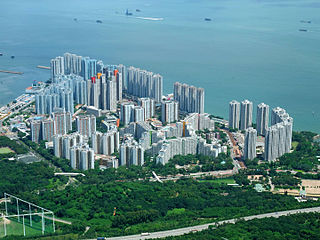
The following is an overview of public housing estates in Tuen Mun, Hong Kong, including Home Ownership Scheme (HOS), Private Sector Participation Scheme (PSPS), Sandwich Class Housing Scheme (SCHS), Flat-for-Sale Scheme (FFSS), Subsidised Sale Flats Project (SSFP), and Tenants Purchase Scheme (TPS) estates.
2011–12 Hong Kong Senior Challenge Shield is the 111th season of one of the Asian oldest football knockout competitions, Hong Kong Senior Challenge Shield. Starting from this season, the format will change into a two-legged home-and-away ties competition. The winner Sunray Cave JC Sun Hei has guaranteed a place in the 2013 AFC Cup.
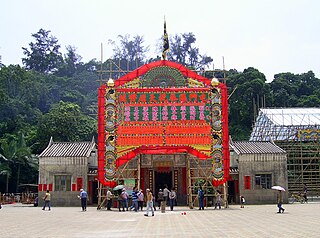
Hau Kok Tin Hau Temple is a Tin Hau temple in Tuen Mun, Hong Kong.

The Tuen Mun–Chek Lap Kok Link is a road project in the New Territories, Hong Kong. It comprises two elements: the "Northern Connection" and the "Southern Connection". The Northern Connection comprises an undersea tunnel crossing the Urmston Road, linking Tuen Mun to the "Boundary Crossing Facilities" (BCF), an artificial peninsula connected to Hong Kong International Airport. The Southern Connection, officially named Shun Long Road (順朗路), comprises viaducts linking the BCF to North Lantau Highway on Lantau Island.

Tuen Tsz Wai is a village of Hong Kong, located in the Lam Tei area, in the northern part of Tuen Mun District. Part of the village is a historic Punti walled village.
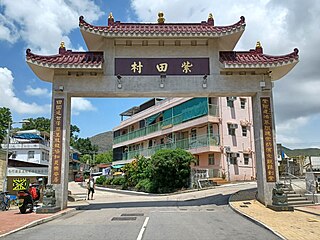
Tsz Tin Tsuen is a village in Lam Tei, Tuen Mun District, Hong Kong.

Lam Tei Reservoir is a funnel-shaped reservoir located at the back hill of Lingnan University in Fu Tei, Tuen Mun, Hong Kong with an area of 17,000 m2 and a water storage capacity of 116,000 m3. It is located at the western edge of Tai Lam Country Park and less than one kilometre away from Hung Shui Hang Reservoir. Like Hung Shui Hang Reservoir, it is part of Tai Lam Chung Reservoir's further water supply plan and an irrigation reservoir. The water from the reservoir eventually flows through the Tuen Mun River and empties into the Castle Peak Bay. The reservoir can be accessed by Stage 2 of the Tuen Mun Trail.

















